How Far Back Does a Criminal Background Check Go in Florida?
Criminal background checks can go back indefinitely; however, there is a caveat. See “Does Florida Follow the 7-year Rule?”
 Written by Background Check Repair
Written by Background Check Repair
Background Checks | May 29, 2024
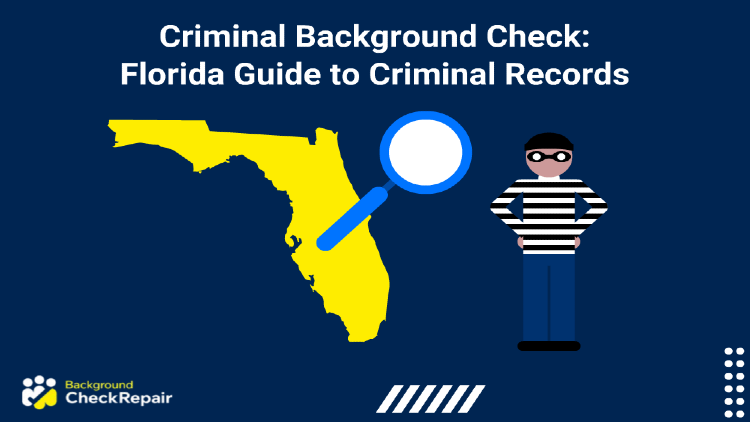
Table of Contents
Knowing how a criminal background check Florida works is an important tool for employers and individuals. An estimated one in three Americans have criminal records.1 So, understanding Florida’s laws concerning criminal records can help you check potential employees, but also check yourself to verify that all the information is accurate.
Although there are many kinds of background screenings used around the country, Florida is the only state to have codified what exactly is involved in a level 1 background check and a level 2 background check.
Florida Law does not prevent employers from conducting background checks on job applicants. In fact, the reverse is closer to the truth; certain aspects of Florida law encourage employers to conduct thorough checks of potential employees. Florida employers are legally protected from “negligent hiring” if they conduct complete background checks on applicants and only hire individuals who have no undesirable results on their reports.
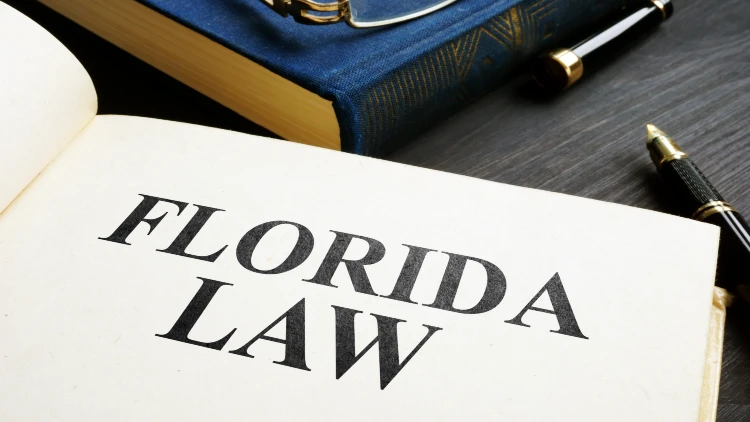
According to the 2021 Florida Statute Chapter 435 “Employment Screening,” there are two types of screening standards: Level I and Level II.2 Florida is the only state to have these legal definitions.
A Level 1 check is the most basic sort. It uses only a person’s name (but can include other factors such as date of birth or social security number) as search parameters in a single jurisdiction, which is usually where the person in question resides, an employment history verification, as well as a check against the National Sex Offender Registry. It may include a record check of the local law enforcement jurisdiction. Level 1 background checks can typically be completed within 2-3 business days.
A Level 2 check is a more in-depth, fingerprint-based report that examines state and national registries. These checks are often used for individuals who will be working in positions of high responsibility (e.g., upper management) or trust (e.g., working with minors, elderly, patients, or other vulnerable groups). Since it is a fingerprint-based investigation, it does check criminal histories.
Level II checks can often be completed between 3-7 business days, assuming the entity conducting the background check isn’t backlogged with requests. This type of background check is common with all positions that require any type of fingerprint clearance.
Although criminal histories are examined for both Level 1 and Level 2 background checks, not all crimes would disqualify a candidate. Both lists contain the same disqualifying offenses, such as certain circumstances of sexual misconduct, adult abuse/neglect, relating to manslaughter or homicide, other violent offenses, and some offenses related to children, arson, burglary, and other felony charges.3
Unlike other states, Florida classifies two main types of background checks as “Level 1” and “Level 2.” The terms “background check” and “criminal background check” are often used interchangeably. Florida’s definition of “Level 1” or “Level 2” background checks means criminal history checks.
“Background checks” by other agencies can vary in depth. Some companies only search criminal histories and national sex offender registries; others might delve into work history, finances (including bank accounts and creditors), liens, work history, education, training and licensing, public access to court information (for civil, criminal, and traffic cases, as well as marriage licenses), vital records, property ownership, former residences, phone numbers, and even social media. Each tidbit of information is another piece of the puzzle, which can connect to several more facts.
In order for an employer to conduct a background check in Florida, the Fair Credit Reporting Act mandates that employers must:7
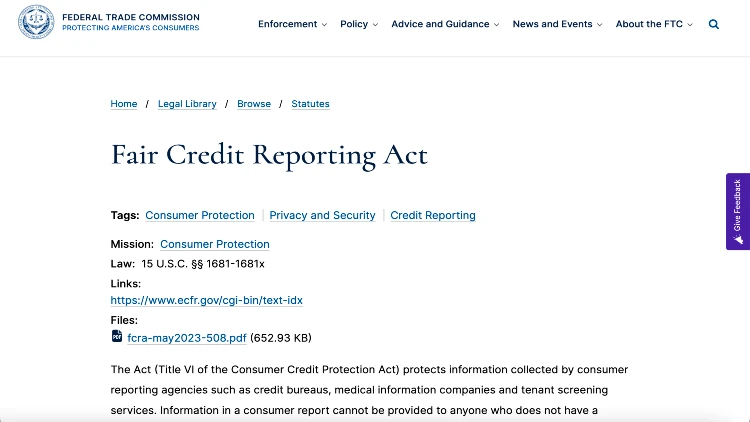
(Image: Federal Trade Commission7)
Federal law requires all Florida firearms dealers to conduct criminal background checks through the Florida Department of Law Enforcement (FDLE) when selling or delivering firearms from their inventory at their licensed premises to anyone except a licensed dealer, importer, or manufacturer. They must also inspect proper photographic identification, request that the Florida Crime Information Center and National Crime Information Center systems be checked as of that date, and retain a unique approval number from the FDLE along with the date.
Applicants are prohibited from purchasing a firearm if they have been convicted of a felony, a misdemeanor categorized as domestic violence, or if a court has determined that person to be mentally incompetent.4
In Florida, employers benefit from completing background checks on potential applicants. This is usually done through a contracted third-party screening company. If a background check uncovers no concerning information, the employer is then presumed innocent in any case of negligent hiring regarding that applicant.
Yes, landlords can conduct criminal background checks on potential tenants. In fact, any individual – not just potential landlords or employers – can request a criminal history on another person since the information contained within is public information. You can conduct a background check to find an old friend, investigate a new romantic partner, or research a potential caretaker.
In 1909, the “Public Records Act” of the Florida Statutes declared that any records created or obtained by a public agency during official business are available for inspection unless specifically exempted by the Florida Legislature.5
“Public Records” has since morphed to include not only traditional written documents, such as papers, maps, and books, but other documentation such as film, photographs, tapes, sound recordings, records, and other material stored in computers.
Many people have questions about Florida laws and how they pertain to background checks. The following are some of the most common.
No, Florida has not passed a statewide “Ban the Box” law. “Ban the Box” is an American campaign that advocates for former offenders. Their goal is to remove any questions about a person’s criminal history from an employment application. This campaign would mean employers could not conduct background checks on potential new hires until an official offer of employment has been made.
Although Florida currently has no statewide law in place, several Florida jurisdictions have adopted local laws or ordinances to “Ban the Box,” which are implemented for public sector jobs (but not currently in private sectors).
Florida’s Dept. of Law Enforcement (FDLE) provides a comprehensive background check service for a small fee.8 To be more specific, the Criminal Justice Information Services Division (CJIS) is the specific arm of Florida’s law enforcement agency that conducts this in-depth criminal history record check. The service is provided for a charge of $24.00.
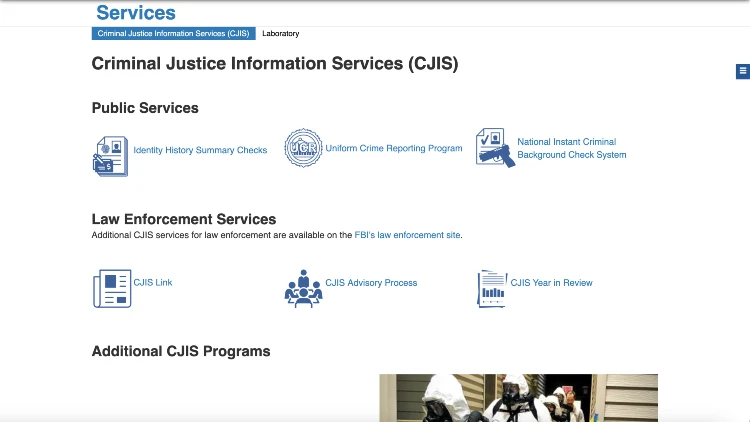
(Image: FBI10)
Other third-party agencies or screening companies offer background checks for $19.95 and up; however, the most accurate information for a criminal history comes directly from the FDLE CJIS.
Yes. A “Level 1” criminal background check (Florida) searches criminal records via name only while a “Level 2” check searches by fingerprints.
Unfortunately, you cannot obtain a free background check in Florida that contains criminal history. Some companies advertise “free” background checks, but remember the old adage “You get what you pay for,” and those companies may not be using the most recent or accurate information.
Official Florida criminal history record checks can be done directly through the Florida Department of Law Enforcement (FDLE),9 Division of Criminal Justice Information Services (CJIS). These reports are available to government agencies for licensing and employment; the information is also available to any member of the public for a nominal fee.
If you find information on your background check that is inaccurate, you will first want to notify your intended employer of the error. Immediately after that, contact the screening company; it is best to make a phone call and then follow up with a letter detailing the error as well as the correct information.
Once the screening agency has your dispute in hand, they are allotted 30 days to review and look into the issue and must provide feedback on the outcome within 5 more days. If the screening company is unable to verify information in your background check, then the information must be deleted. You can then request that they send a corrected report to any agency or individual who has received a report on you within the past two years. You are also able to obtain another free copy of your report within 60 days.
Many employment screening companies will provide you with one free report on yourself every twelve months. A list of consumer reporting agencies can be found on the website of the Consumer Financial Protection Bureau.6
Background checks have become so customary in our society that, in fact, a reported 96% of all employers now utilize some sort of background check in the hiring process. Background checks are not a one-size-fits-all process and they aren’t just for employers and landlords. Their primary function is to verify a person’s identity and assess their integrity based on a pattern of behavior.
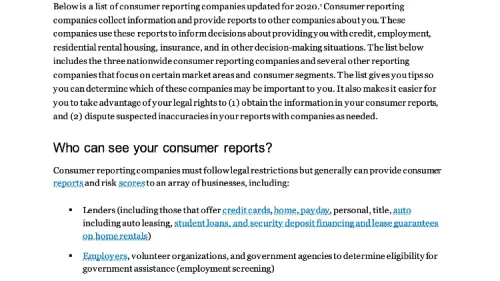
(Image: Consumer Financial Protection Bureau6)
In the twenty-first century, information is everywhere. With only a name, anyone can conduct a background check on another person (for personal reasons). Whether you are the subject of the investigation or the one running the report, you want to make sure that information is accurate.
Employers want to make sure they hire the right person for the job. Unfortunately, not everyone is honest in their applications. Background checks help employers verify that their applicants are indeed who they say they are.
Applicants want to make sure that their reports are accurate so they can present themselves in the brightest light. Have you ever run your own background check? Experts recommend you run your own credit check at least once a year to identify fraud as early as possible. The same should go for a comprehensive background check to eliminate any damaging surprises.
The best way to pass a background check is to be completely honest. When in doubt, disclose everything. It is better to divulge any negative information up front and run the risk of not passing a background check than to try to hide something that the requestor might not find concerning.
Florida has codified the two types of background checks used throughout the country, both of which examine criminal records and the National Sex Offender Registry. Level 1 searches use only a person’s name to search a local jurisdiction while Level 2 searches utilize fingerprints. A criminal background check Florida guide provides the information you need to know to conduct one on yourself or on someone else.
Criminal background checks can go back indefinitely; however, there is a caveat. See “Does Florida Follow the 7-year Rule?”
Yes, according to the Fair Credit Reporting Act’s (FCRA) “7-year rule” certain criminal records must be removed from an applicant’s history after 7 years. These records include civil judgments, arrest records, tax liens, and civil suits; they do not include felony convictions.
No, Florida’s Legislature has implemented a nominal fee of $24 for criminal history record checks. Beware of any third-party agencies promising a no-cost criminal history check.
1The Sentencing Project. (2015). Americans with Criminal Records Poverty and Opportunity Profile. The Sentencing Project. Retrieved October 13, 2021, from <https://www.sentencingproject.org/wp-content/uploads/2015/11/Americans-with-Criminal-Records-Poverty-and-Opportunity-Profile.pdf>
2Florida Department of Law Enforcement. (2021). Criminal History Records. Obtaining Criminal History Information. Florida Department of Law Enforcement. Retrieved October 13, 2021, from <https://www.fdle.state.fl.us/Criminal-History-Records/Obtaining-Criminal-History-Information.aspx>
3Florida State Government. (2021). Background Screening Briefing. Florida State Government. Retrieved October 13, 2021, from <https://www.flgov.com/wp-content/uploads/childadvocacy/20150520_Background_Screening_Briefing.pdf>
4Florida State Government. (2021). The 2021 Florida Statutes. Florida State Government. Retrieved October 13, 2021, from <http://www.leg.state.fl.us/statutes/index.cfm?App_mode=Display_Statute&URL=0700-0799/0790/Sections/0790.065.html>
5Florida State University College of Law. (2019). Freedom of Information and Public Records: Florida: Public Records and Sunshine Laws. Florida State University College of Law. Retrieved October 13, 2021, from <https://guides.law.fsu.edu/FOIA/Florida>
6Consumer Financial Protection Bureau. (2020). List of Consumer Reporting Companies. Consumer Financial Protection Bureau. Retrieved October 13, 2021, from <https://files.consumerfinance.gov/f/documents/cfpb_consumer-reporting-companies-list.pdf>
7Federal Trade Commission. (2024). Fair Credit Reporting Act. FTC.gov. Retrieved May 8, 2024, from <https://www.ftc.gov/legal-library/browse/statutes/fair-credit-reporting-act>
8Florida Department of Law Enforcement. (2019, January 1). Criminal History Record Check Fee Schedule. Florida Department of Law Enforcement. Retrieved May 8, 2024, from <https://www.fdle.state.fl.us/Criminal-History-Records/Documents/Criminal-History-Fee-Chart_January2019.aspx>
9Florida Department of Law Enforcement. (2024). Obtaining Criminal History Information. Florida Department of Law Enforcement. Retrieved May 8, 2024, from <https://www.fdle.state.fl.us/Criminal-History-Records/Obtaining-Criminal-History-Information>
10Criminal Justice Information Services (CJIS). Federal Bureau of Investigation. Retrieved May 28, 2024, from <https://www.fbi.gov/services/cjis>
We use cookies to ensure that we give you the best experience on our website. If you continue to use this site we will assume that you are happy with it